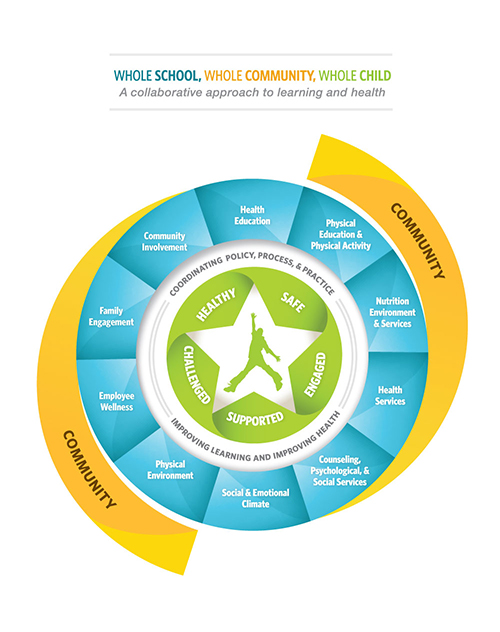
1 Institute of Medicine (2015). Exploring Opportunities for Collaboration Between Health and Education to Improve Population Health: Workshop Summary. Washington, DC: The National Academies Press.
2 ASCD, Learning and health. Retrieved from ASCD Learning and Health
3 Centers for Disease Control (n.d). Whole school, whole community, whole child (WSCC). Retrieved from https://www.cdc.gov/whole-school-community-child/about/index.html.
4 Bronfenbrenner, U. (1979). The Ecology of Human Development: Experiments by Nature and Design. Cambridge, MA: Harvard University Press.
A Whole School, Whole Community, Whole Child (WSCC) Model
Education, economic stability, and social context can be significant contributors to overall health – with level of education consistently emerging as a major influence, contributing more additional quality‐adjusted life years than those gained by not smoking or maintaining normal blood pressure.1 On the other hand, a child’s health and well-being is key to their academic achievement and enjoyment of school.
“The child who is unhealthy—physically, socially, emotionally, or mentally—struggles to excel in school just as the child who is underprepared by education struggles to maintain health and well-being, often for years to come. Learning and health are symbiotic, with one serving and supporting the other.”2
In 2014, ASCD and U.S. Centers for Disease Control and Prevention (CDC) jointly developed the Whole School, Whole Community, Whole Child3 (WSCC) model, which prioritizes the necessity of collaboration across education and health sectors to accomplish child well-being.
CSCH utilizes and expands upon this model and acknowledges the interrelated contributors to child well-being across multiple systems and disciplines, embraces an ecological systems4 framework, and integrates the extant influences of culture, health care disparities and the social determinants of health on children's outcomes.
CSCH research and dissemination informs policy, processes, and practices connected with the WSCC model domains.